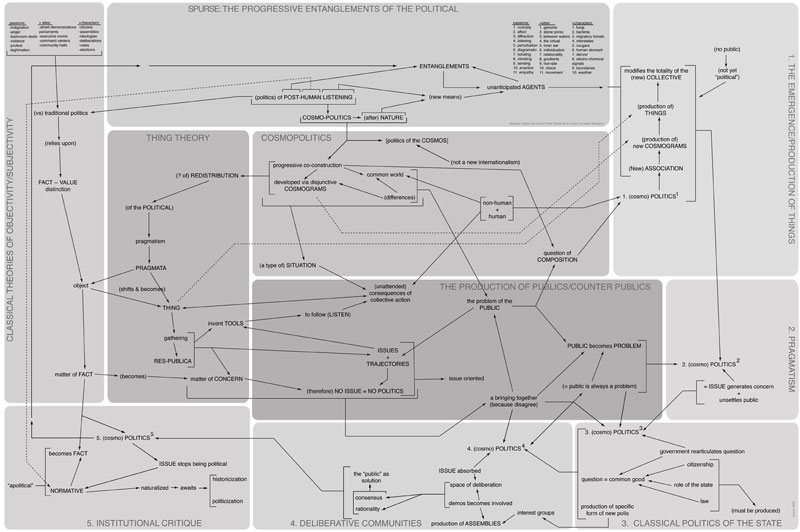Spurse is a research and design collaborative that catalyzes critical issues into collective action.

Title: meeting entangled worlds: a pragmatic diagram for collective revision Description: This diagram evolved out of our desire to develop a set of political tactics that avoid the pitfalls of liberal democracies. Proceeding on the basis of things called “individuals” and “rights”, the conventional politics of the state act as if the world is already neatly composed and, as such, drastically limit the potential for substantive change. We believe that politics emerge not from issues or identities, but when we refuse these categories and find the means with which to provoke new aggregates. What processes can we develop to strategically leverage controversies and crises to dissolve and reassemble the boundary conditions between people, things and their processes of differentiation? The question is not simply who can and cannot speak, but rather what procedures can we construct to dialogue with others, both human and non-human, and insure their space within a new collective? We envision this diagram as a set of diagnostic tools and are very interested in the uses people might make of it in their own practice; please send us your stories and feedback! Date: 2008-ongoing
Download PDF
Yes, the art world has “stepped up as a growing platform for our output—our projects are finding support and ever larger stage…” and yes “time and again we are given the opportunity to talk, think, and work collectively…” (Herbst). While it is true that venues have supported the exhibition of artwork that represent alternative models—the more relevant and obvious truth is that none of these so called progressive institutions have the mechanisms in place or will to make the necessary structural changes to support the actual practices of so called progressive works. The structures of these museums, galleries, and institutions constantly seek the new and privilege an infinite loop of exhibitions and events delivered in monthly installments. Sure, we are as delighted as the next person/collective/artist by inclusion in speed dating events, flavor of the month venues, fleeting presentations of “our ideas,” and the wonders of panel discussions to convince artists that this too is art. We are happy to give hurried workshops for hurried consumers, and to be set up as model practices in the best of model zoos. But, all irony and useless cynicism aside, the simple creative question is why bother? True change requires real commitments to structural and systemic transformation, the work that we, and others, envision cannot be sustained within the current institutional model of the art world. These commitments, structures and practices are evolving all around us in powerful ways. While we explore what potential the discursive site of art and its attendant institutions have to offer, we should also be looking well outside these spaces.
There is great work to be done, many have been doing it for a very long time, and little of it now has to do with the so-called art worlds. We are happy/curious/challenged/engaged in the development of new strategies for producing new forms of the commons – and letting this lead us wherever it takes us. Here is our question for those also leaving or simply strategically passing through these so-called art spaces: Our interest lies in the many glorious experiments that produce new forms of collective action—how people, ideas, territories, other species, practices, habits can meet to co-develop new modes of being in the world that go beyond shallow consumerism or reflexive oppositional politics. This is where we wish to begin. The narrow bandwidth accorded to politics/arts by contemporary society is mainly exclusionary, dysfunctional and, frankly, boring in no small part because it proceeds on the basis of things like rights, representation, and consensus. How can we all take care to avoid having our work captured and re-territorialized by these normative models of art/politics? If we are going to work together, perhaps we need to step back and think about how this “we” might be re-constituted?There is no ideal place to start and we have little interest in keeping ourselves pure, so let us move to the joyously filthy work of assembly. All irony and kidding aside, we wish to work towards developing new forms of the commons with whomever/whatever shows up. Let’s get started.
Download a PDF of the chart
– Contact us at spurse01@gmail.com.
